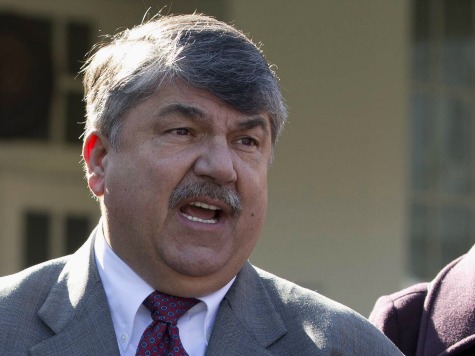
On Monday, as millions of American workers gathered with family and friends to celebrate and mark the end of summer, the nation’s union bosses were preparing to inject tens of millions of dollars from their members’ paychecks into the midterm elections in November. Unions have already spent $70 million to protect the Democrat majority in the Senate. Even this amount is likely to be dwarfed by a flood of money and manpower in the final weeks of the campaign.
Union money, which is continually replenished through dues from members’ pay, is just the most public expression of union political power. More critical in many campaigns are the thousands of rank-and-file union members the bosses can mobilize to provide on-the-ground manpower. Many union members are given election day off from work, allowing them to work the polls for Democrats and help boost turnout.
To a point, this is a snapshot of recent political history in America. Projecting political power has always been a part of labor’s tool-box. What’s unusual is that this political power, in recent years, has been employed to defend a Democrat party policy agenda that is generally unrelated to workplace or labor issues.
Soon after Obama’s reelection, a top political priority for Senate Democrats was enacting sweeping new gun control legislation. A second priority has been implementing ObamaCare, which itself is built on a new tax on union health care benefits. Senate Democrats have also spent a considerable amount of political capital on amnesty and dramatically boosting the number of unskilled workers in labor force.
On the economic front, Senate Democrats have tried to slow down domestic energy exploration and production and blocked a vital new pipeline. The party has abetted an effort to close hundreds of coal mines and utility plants and supported even more environmental regulations on new construction. The entire energy sector, which provides lots of high-paying union jobs, is reeling from self-inflicted wounds championed by Democrats in the Senate.
Even the very high-profile push to raise the minimum wage would do little to offset these economic losses. While debate may rage over how many jobs are lost due to higher mandated wages, few would argue that the policy boosts employment. In any case, most union collective bargaining agreements are exempt from federal rules and regulations concerning wages. The policy provides very little benefit for rank-and-file union members, even though political spending from their earnings are a critical support for legislating a wage hike.
So, while union political power and money will be critical to protecting the Democrat majority in the Senate, it won’t translate into policies that are relevant, or even popular, with most union members. Defending Senate Democrats will enhance the political clout of union leaders in Washington, but it will do little to increase the economic opportunity or values of its members.
The political story of the 21st Century is the growing gulf between average Americans and a political elite in Washington. Even the vaunted union hall is now just another piece on the political chess board.

COMMENTS
Please let us know if you're having issues with commenting.